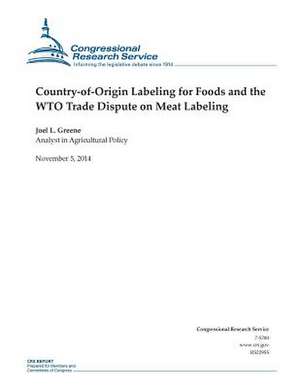Country-Of-Origin Labeling for Foods and the Wto Trade Dispute on Meat Labeling
Autor Congressional Research Serviceen Limba Engleză Paperback
| Toate formatele și edițiile | Preț | Express |
|---|---|---|
| Paperback (2) | 125.29 lei 3-5 săpt. | |
| CREATESPACE – | 125.29 lei 3-5 săpt. | |
| CREATESPACE – | 125.52 lei 3-5 săpt. |
Preț: 125.29 lei
Nou
Puncte Express: 188
Preț estimativ în valută:
23.98€ • 24.94$ • 19.79£
23.98€ • 24.94$ • 19.79£
Carte disponibilă
Livrare economică 25 martie-08 aprilie
Preluare comenzi: 021 569.72.76
Specificații
ISBN-13: 9781503188013
ISBN-10: 1503188019
Pagini: 56
Dimensiuni: 216 x 279 x 3 mm
Greutate: 0.15 kg
Editura: CREATESPACE
ISBN-10: 1503188019
Pagini: 56
Dimensiuni: 216 x 279 x 3 mm
Greutate: 0.15 kg
Editura: CREATESPACE
